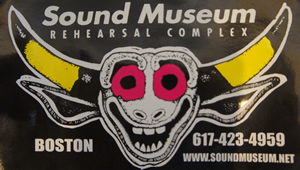 Boston folkie Terry Kitchen has just released Next Time We Meet, his 15th full length album in his long, storied career , a singer-songwriter career that dates back to 1991 which was when he came off a band career that had dated back to to the early 1980s. Kitchen’s prolific output can be linked to his interesting life experiences. Whether he’s singing about something from his own life or describing another’s life, he supports it with a beautifully direct vocal style augmented by tremendous subtle details in his guitar work as well as from some special musical guests.
Boston folkie Terry Kitchen has just released Next Time We Meet, his 15th full length album in his long, storied career , a singer-songwriter career that dates back to 1991 which was when he came off a band career that had dated back to to the early 1980s. Kitchen’s prolific output can be linked to his interesting life experiences. Whether he’s singing about something from his own life or describing another’s life, he supports it with a beautifully direct vocal style augmented by tremendous subtle details in his guitar work as well as from some special musical guests.
Opening track “Melanie” finds Kitchen singing heartily over a natural acoustics lines from a banjo and a mandolin. Kitchen puts a lot of heart into this, making one feel what the song is about, a struggling love relationship that takes as much heart as this tune conveys.
Humorous song “Party On The Roof” speaks of a beloved gathering of friends, so close knit that nobody else is invited. Kitchen sings it so warmly with so much wit in his lyrics that one can almost miss the point that it is a party for the wealthiest. The warm vocal tone belies tales of drunken and drugged debauchery at that party and how the consumption of everything reflects Kitchen’s view of how that class are exploiting us all.
A bittersweet tale of what might have been, “The Times We Almost Kissed” lets Kitchen emote aloud about a woman who could have been more than a friend. The times he almost kissed her were signposts throughout their friendship. Neither could make the move to change their fates, and the forlorn warmth, as well as dreamy backing coos from Deede Bergeron and Brice Buchman perfectly capture the sense of loss as well as the sense of treasuring what they did have.
“How Many Horses” flows beautifully in its lyrics, its vocals ,Bob Harris’s mandolin melody and a floating Kitchen harmonica line. Images of Kitchen’s cousin’s family horse barn, falling off of horses, getting back on make up the innocently sweet theme of this song. While the lyrics admit the rider kept falling off the horse, the rider has no regrets, as breaking bones toughened him for the journey of life ahead.
“White Lung” follows the life path of a woman who had escaped the Mekong to become a nail salon owner in New York City. With Mara Levine’s backing vocals, Kitchen draws a mournfully beautiful portrait of this woman and the life she lives, never quite being in a better place even though she has escaped to America. Emotive acoustic guitar chords color the images of the tell tale lyrics with something sad, remote. The woman passes her business and her lung infections onto her daughter. The acoustic guitar has a recycling feeling in its chords, suggesting that this family’s lifestyles and life choices may never end.
A nostalgic feeling permeates title track “Next Time We Meet,” a tale in which Kitchen looks back on his junior high school best friends and their dreams of starting a world famous rock band. This tune celebrates a life that has gone by in special moments, a friend finding his love at a dorm party, holding ones’ daughter for the first time in a delivery room. Kitchen imbues this with a longing for the past while also respecting it. The slowly unfolding warmth comes through in his voice, a voice that subtly widens in emotion to gather up all the quiet glory he sings of.
Kitchen reflects on all of the people who taught him the importance of patience during “Get There Soon Enough.” Illustrating his point with memories of his dad and then his first girlfriend, the singer-songwriter takes us through his narrative of gaining maturity. He develops, with a patient, considerate pace, how the best things in life are worth the wait. His smooth vocal is as warm as his lyrics are reflective, paid out over a steady pattern of guitar notes, furthering his sense of enjoying each moment until the end.
Caressed by Jackie Damsky’s whispery, wistful violin line and Amy Malkoff‘ soft, dreamy backing vocal, “Last Sand Castle Standing” suggests Kitchen doesn’t want to be just another ephemeral artwork washed out to sea. While this very pretty, gentle tune glides by like a pleasant daydream, Kitchen’s hearty vocal poignantly releases his honest reflection.
With a snappy, sustained lead guitar line buttressing its weepy emotion, “Empty Mansions” reflects on the sadness of losing a true love. The singer-songwriter contemplates what his life, despite his riches, is like without his lady love. Kitchen’s earnestness comes through in his understated vocal. His acoustic guitar notes, soft drops of forlorn loneliness, fall like a drizzle over his regretful soundscape. Only true artists can bemoan their fate with such beauty and with such honesty.
“Fireball Cinnamon Whisky” is about one of those young women who all the guys in the bar notice. Unobtainable, the woman of the song’s title is a discriminating force of nature. Kitchen’s mellow vocal timbre here reflects on his vulnerability around this hard driving female. Backing vocals from Deede Bergeron, Brice Buchanan, and Rebecca Lynch along with Roger Williams’ crying banjo notes make the perfect support for this theme song. Kitchen has come up with a fine song to capture the essence of the most sought after woman.
With a brisker pace, “Hole In The Bottom Of A Lie” builds up tension in its lyrical content and in its musical growth. Kitchen takes aim at his own little white lie, singing of how it caught up to him, leaving him drowning in his own personal secret. With total sincerity in his voice, Kitchen keeps the quality of the song afloat even though the person the song is about sinks quite deeply.
Kitchen closes out with his own rendition of The Beatles’ “Norwegian Wood,” a faithful recreation of the acoustic melody, vibe, and the sweet innocence of spending the night at another’s flat.
Kitchen offers many examples of his fine talent on Next Time We Meet. Listeners can feel something in his voice, his lyrics, his musicianship, and in the musicianship of his many well regarded backing players. What ties this entire album together is Kitchen’s honest, heartfelt recollections of some of his life’s most personally profound moments. Kitchen takes his stories and develops them in colorful imagery, like a great movie with a touching score. With guest musicians Mara Levine, Rebecca Lynch, Brian Middleton, Bob Harris, Don Barry, and Chris Peeler gathered at a friend named Ro’s house in Roslindale, Massachusetts, mastered by Toby Mountain at Northeastern digital, Washington D.C., Kitchen provides a crisp, clear glimpse into his inspired life.

